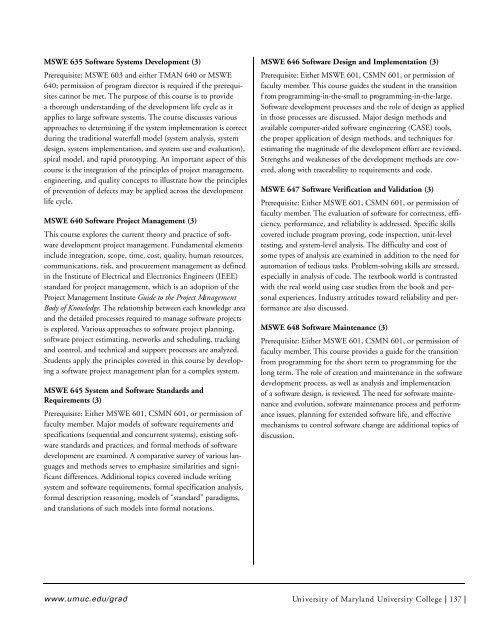A+B. Intro_SJ.1 - University of Maryland University College
A+B. Intro_SJ.1 - University of Maryland University College
A+B. Intro_SJ.1 - University of Maryland University College
Create successful ePaper yourself
Turn your PDF publications into a flip-book with our unique Google optimized e-Paper software.
MSWE 635 S<strong>of</strong>tware Systems Development (3)<br />
Prerequisite: MSWE 603 and either TMAN 640 or MSWE<br />
640; permission <strong>of</strong> program director is required if the prerequisites<br />
cannot be met. The purpose <strong>of</strong> this course is to provide<br />
a thorough understanding <strong>of</strong> the development life cycle as it<br />
applies to large s<strong>of</strong>tware systems. The course discusses various<br />
a p p roaches to determining if the system implementation is corre c t<br />
during the traditional waterfall model (system analysis, system<br />
design, system implementation, and system use and evaluation),<br />
spiral model, and rapid prototyping. An important aspect <strong>of</strong> this<br />
course is the integration <strong>of</strong> the principles <strong>of</strong> project management,<br />
engineering, and quality concepts to illustrate how the principles<br />
<strong>of</strong> prevention <strong>of</strong> defects may be applied across the development<br />
life cycle.<br />
MSWE 640 S<strong>of</strong>tware Project Management (3)<br />
This course explores the current theory and practice <strong>of</strong> s<strong>of</strong>tware<br />
development project management. Fundamental elements<br />
include integration, scope, time, cost, quality, human resources,<br />
communications, risk, and procurement management as defined<br />
in the Institute <strong>of</strong> Electrical and Electronics Engineers (IEEE)<br />
standard for project management, which is an adoption <strong>of</strong> the<br />
Project Management Institute Guide to the Project Ma n a g e m e n t<br />
Body <strong>of</strong> Know l e d g e . The relationship between each knowledge are a<br />
and the detailed processes required to manage s<strong>of</strong>tware projects<br />
is explored. Various approaches to s<strong>of</strong>tware project planning,<br />
s<strong>of</strong>tware project estimating, networks and scheduling, tracking<br />
and control, and technical and support processes are analyzed.<br />
Students apply the principles covered in this course by developing<br />
a s<strong>of</strong>tware project management plan for a complex system.<br />
MSWE 645 System and S<strong>of</strong>tware Standards and<br />
Requirements (3)<br />
Prerequisite: Either MSWE 601, CSMN 601, or permission <strong>of</strong><br />
faculty member. Major models <strong>of</strong> s<strong>of</strong>tware requirements and<br />
specifications (sequential and concurrent systems), existing s<strong>of</strong>tware<br />
standards and practices, and formal methods <strong>of</strong> s<strong>of</strong>tware<br />
d e velopment are examined. A comparative survey <strong>of</strong> various languages<br />
and methods serves to emphasize similarities and significant<br />
differences. Additional topics covered include writing<br />
system and s<strong>of</strong>tware requirements, formal specification analysis,<br />
formal description reasoning, models <strong>of</strong> “standard” paradigms,<br />
and translations <strong>of</strong> such models into formal notations.<br />
MSWE 646 S<strong>of</strong>tware Design and Implementation (3)<br />
Pre requisite: Either MSWE 601, CSMN 601, or permission <strong>of</strong><br />
faculty member. This course guides the student in the transition<br />
f rom programming-in-the-small to pro g r a m m i n g -in-the-large.<br />
S<strong>of</strong>tware development processes and the role <strong>of</strong> design as applied<br />
in those processes are discussed. Major design methods and<br />
available computer-aided s<strong>of</strong>tware engineering (CASE) tools,<br />
the proper application <strong>of</strong> design methods, and techniques for<br />
estimating the magnitude <strong>of</strong> the development effort are re v i ewe d .<br />
Strengths and weaknesses <strong>of</strong> the development methods are covered,<br />
along with traceability to requirements and code.<br />
MSWE 647 S<strong>of</strong>tware Verification and Validation (3)<br />
Prerequisite: Either MSWE 601, CSMN 601, or permission <strong>of</strong><br />
faculty member. The evaluation <strong>of</strong> s<strong>of</strong>tware for correctness, efficiency,<br />
performance, and reliability is addressed. Specific skills<br />
covered include program proving, code inspection, unit-level<br />
testing, and system-level analysis. The difficulty and cost <strong>of</strong><br />
some types <strong>of</strong> analysis are examined in addition to the need for<br />
automation <strong>of</strong> tedious tasks. Problem-solving skills are stressed,<br />
especially in analysis <strong>of</strong> code. The textbook world is contrasted<br />
with the real world using case studies from the book and personal<br />
experiences. Industry attitudes toward reliability and performance<br />
are also discussed.<br />
MSWE 648 S<strong>of</strong>tware Maintenance (3)<br />
Prerequisite: Either MSWE 601, CSMN 601, or permission <strong>of</strong><br />
faculty member. This course provides a guide for the transition<br />
from programming for the short term to programming for the<br />
long term. The role <strong>of</strong> creation and maintenance in the s<strong>of</strong>tware<br />
development process, as well as analysis and implementation<br />
<strong>of</strong> a s<strong>of</strong>tware design, is re v i ewed. The need for s<strong>of</strong>tware maintenance<br />
and evolution, s<strong>of</strong>tware maintenance process and perf o r m-<br />
ance issues, planning for extended s<strong>of</strong>tware life, and effective<br />
mechanisms to control s<strong>of</strong>tware change are additional topics <strong>of</strong><br />
discussion.<br />
w w w. u m u c . e d u / g r a d<br />
Un i versity <strong>of</strong> Ma r yland Un i versity <strong>College</strong> | 137 |

















